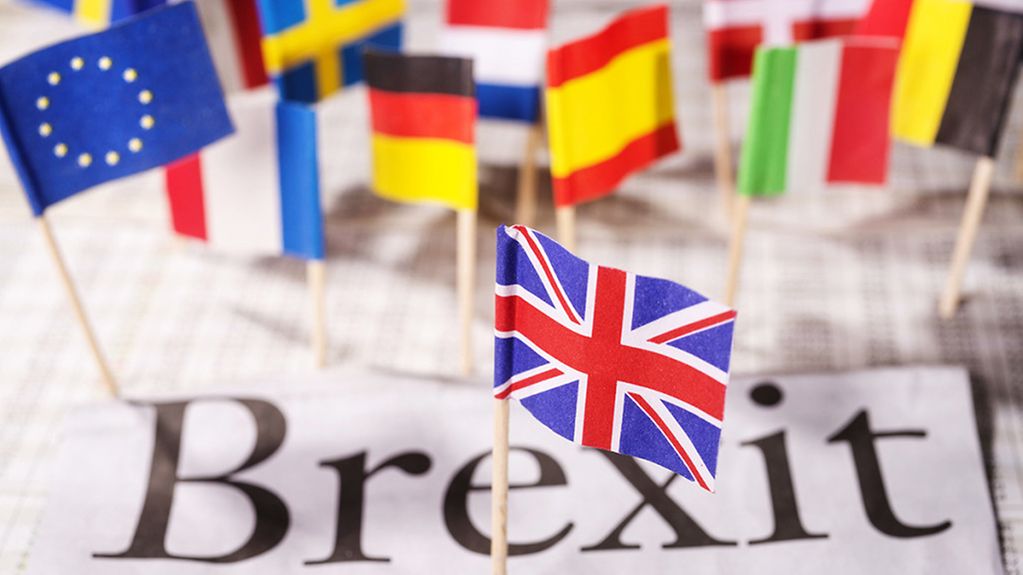Angela Merkel on the Brexit
"Today is a blow for Europe, and a blow for the European integration process," declared Chancellor Angela Merkel in Berlin following the British vote to leave the European Union. The conclusions from the referendum in the United Kingdom, she said, should be drawn from a historical perspective.
4 min reading time

United Kingdom votes to leave the EU
Photo: picture-alliance/Ohlenschläger
Chancellor Angela Merkel has described the outcome of the referendum in the United Kingdom as a blow for Europe and for the European integration process. The situation, she said, should now be analysed calmly and collectedly. "The European Union is strong enough to find the right answers to these events," said Angela Merkel.
Europe is diverse. "The expectations that people have of the European Union are as diverse as the people of Europe themselves." Now it is important to communicate to the people how much the EU is doing to improve their situation.
The EU – the philosophy of peace
The entire philosophy of European integration is a philosophy of peace. "Peace is not self-evident now and it will not be self-evident in future," declared the Chancellor. It is very much in Germany’s interests for European integration to succeed.
The European Union is a unique community of values and solidarity. "It is what guarantees us peace, prosperity and stability." We can only preserve these if we work together, she said.
The will to help shape globalisation
The challenges now facing us are on a scale that cannot be addressed by any individual state. The EU is one of the largest economic areas in the world. "It must see itself as a committed partner in the world, a partner who has a role to play shaping globalisation and who wants to help shape globalisation."
The aim should be to ensure that the United Kingdom’s future relations with the EU will be close and based on partnership, said Angela Merkel with a view to future relations with the UK. "The German government will pay particular attention to the interests of German citizens and the German economy."
The Chancellor has invited the President of the European Council Donald Tusk, the French President François Hollande, and the Italian Prime Minister Matteo Renzi to talks next week. On Tuesday she will give a government statement in the German Bundestag to inform parliament about the next steps.
Final result: 51.9 per cent vote for the Brexit
51.9 per cent of the British electorate voted to leave the EU, and 48.1 per cent voted to remain; 17.4 million voters were in favour of leaving the EU, while 16.1 million expressed their desire to remain. A total of 46.5 million people registered to vote in the referendum. Turnout was 72.2 per cent. In response to the referendum result, the British Prime Minister David Cameron has announced that he will step down by October. He campaigned to remain in the EU.
In the wake of the pro-Brexit vote in the UK, a special session of the German Bundestag will be held, probably on Tuesday, announced Bundestag President Norbert Lammert on Friday before the parliament began business. There will be a government statement in advance of the next European Council meeting.
Every member state of the EU can decide to leave the Union voluntarily. Article 50 of the Treaty on European Union (the Lisbon Treaty) lays out the procedure. In line with the provisions of this Article, the United Kingdom will firstly inform the European Council of its intention to leave. Then the EU will negotiate an agreement with the UK regulating the details and the future relations between the EU and the United Kingdom. When this agreement comes into effect, but within a maximum period of two years (which can be extended), the provisions of the European treaties will cease to apply to the United Kingdom.
UK has left its mark on the EU over several decades, says Frank-Walter Steinmeier
"This is a bitter day for Europe," said Federal Foreign Minister Frank-Walter Steinmeier in Luxembourg. The British have decided, albeit it by a small margin, he said. We must respect their decision. The UK, he added, has left its mark on the European Union over a period of several decades.
"Now it is important that we hold Europe together. We must not become hysterical or be paralysed by shock," said Frank-Walter Steinmeier. This is not an easy day for Europe. "Now it is important to stick together. We must show that we have the strength to weather this crisis."
Europe must stick together following the British vote, said Federal Finance Minister Wolfgang Schäuble in Berlin. "We respect the outcome of the British referendum. I had hoped for a different result." Now we need to look to the future, and deal with the situation in hand. To this end, he added, he is in close contact with his colleagues from the G7 states, the group of the world’s seven leading industrialised nations. The EU’s procedures for leaving the Union are clearly regulated and will now be applied. "That makes for reliability."
Meetings, talks and special sessions of the German Bundestag scheduled to deal with the Brexit
Saturday, 25 June: Federal Foreign Minister Frank-Walter Steinmeier invites the foreign ministers of the European founder states (France, Netherlands, Italy, Belgium, Luxembourg) to a meeting in Berlin.
Monday, 27 June: Chancellor Angela Merkel will meet with the President of the European Council Donald Tusk, the French President François Hollande and the Italian Prime Minister Matteo Renzi for talks.
Tuesday, 28 June: Special session of the German Bundestag; Chancellor to give a government statement.
Tuesday, 28 June and Wednesday, 29 June: European Council to meet in Brussels.